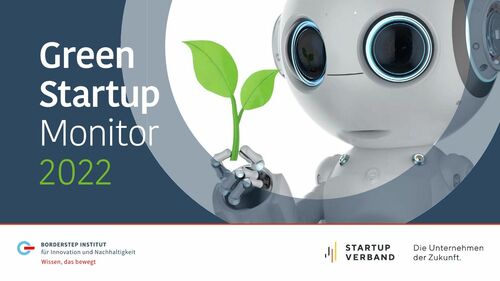The Green Startup Monitor has been describing how Germany’s green startup scene is doing for four years. Universities play an essential role, especially in innovative green start-ups: almost a third of all green start-ups are research-related start-ups. Nevertheless, the study still sees great potential here.
Together with the Borderstep Institute, the German Startup Association presented the Green Startup Monitor 2022 (GSM22) for the fourth time. With current reference to the Ukraine war, it was pointed out that 90 percent of the heat supply in Germany is still provided by fossil fuels. Due to the Germans’ great hunger for fossil fuels, there are problematic dependencies, as is currently the case with Russia. Moreover, the heat supply in Germany currently contributes to two-thirds of greenhouse gas emissions.
One of the most important steps to guarantee independence and security of supply in the short term is to reduce the demand for heat, explained Klaus Fichter, founder and director of the Borderstep Institute for Innovation and Sustainability. According to him, around 20 percent of energy resources could be saved through “things that can be realised relatively quickly”. In this context, he particularly highlighted the start-up vilisto, which operates intelligent indoor climate management and whose business idea came about during his energy technology studies at the Technical University of Hamburg (TUHH): Christoph Berger wrote a project thesis in his Master’s degree at the time, where the aim was to make predictions of room temperatures in unknown rooms and buildings. This is the kind of start-up that can help to bring about the heat transition, said Klaus Fichter at the GSM22 press conference. The dividend here is not just a double one, but a triple one. Moreover, it is believed that green start-ups create jobs (economy), help achieve climate goals (environment) and make the country less dependent on energy imports (freedom).
More government support called for
Especially in the field of green investments, more initiatives are needed, as “you need staying power in climate investments”, David Hanf announced at the GSM22-PK. The board member of the Startup-Verband Deutschland praised the positive development in the green startup scene, but also warned that the short-term goals of private venture capitalists are often contradictory.
In their investments, many often look for some kind of proven manual to minimise risks. However, there are no manuals for investments in disruptive technologies. “The fact that many VCs are looking for such manuals is one of the reasons why we are still far from tackling the climate crisis,” says Daria Saharova of the World Fund. The startups themselves are also calling for more support from policymakers, according to GSM22.
More green startups needed in construction and finance
The share of green startups in the energy and electricity sector and in agriculture (66 percent) is relatively high. In other climate-relevant sectors such as construction and real estate (25 percent), banking and finance (19 percent) or tourism (18 percent), the Monitor sees a need to catch up: “For the realisation of the Sustainable Finance Strategy of the EU and the German government, there is no sufficient push from the start-ups in the banking and finance sector and the insurance industry,” the study criticises.
Great potential: Start-up hotspots are universities
Almost one third of all green start-ups are research-related start-ups. Universities play a major role in innovative green start-ups. According to the study, economists are the most frequent founders, followed by engineers. So far, however, sustainability aspects have hardly been integrated into the promotion of university start-ups. In the future, sustainability-related advisory, coaching and networking services should be developed, e.g. within the framework of EXIST.
The high proportion of women in green start-ups was also positively underlined: as in previous years, this is considerably higher than in the non-green comparison group (21 compared to 16 percent).
Sales still the biggest challenge
Acquiring customers is the biggest challenge for both green and non-green start-ups: 63 percent of the respondents stated this. Product development and raising capital follow. Recruiting staff has also increased in importance.
About the Green Startup Monitor 2022
The data basis for the Green Startup Monitor 2022 was the German Startup Monitor 2021 (DSM), which was conducted by the German Startup Association in cooperation with the University of Duisburg-Essen and PwC Germany. For the study, data was collected online from 1,707 “green startups” with company headquarters in Germany.
The Monitor defines green start-ups as start-ups that are less than ten years old and whose products and services contribute to the ecological goals of a green economy. According to the editors, 29 percent of the start-ups fall into this category. In 2019, the share had still been 21 percent. The increase of eight percentage points shows that green start-ups are now making a significant contribution to start-up activity and innovation activity in Germany.
Link to Green Startup Monitor 2022

